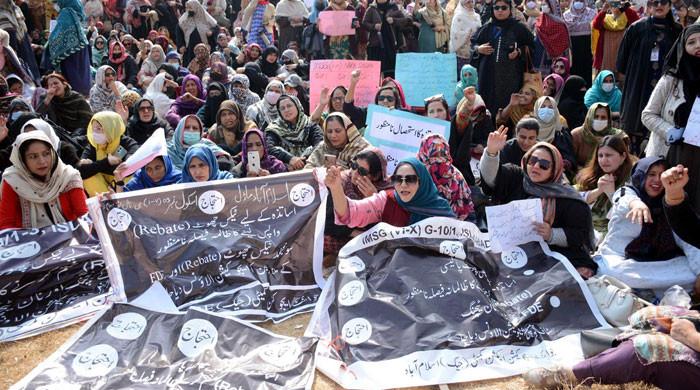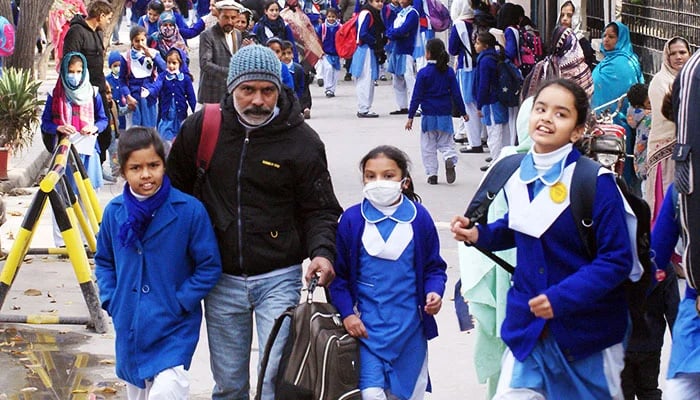Female teachers working in government schools and colleges across Islamabad have been enduring years of unpaid examination and marking duties, prompting them to voice their concerns in strong protests. For the past four years, these educators, assigned various responsibilities under the Federal Directorate of Education (FDE), have not received any payment for their hard work. Even though they were promised a modest honorarium of150 rupee per day, they have not received a single rupee. This situation has left many teachers frustrated and financially strained.
Growing Economic Burden on Teachers
The plight of these teachers has become even more troubling amid rising inflation and increasing household expenses. Many of these educators now say that the situation has become financially unsustainable. In addition to working without pay, they have had to cover out of pocket expenses for materials and transportation. For example, teachers have had to arrange for the transportation of exam papers and materials, purchase sealing wax, thread, and packing cloth, and provide their own stationery.
Given the current inflation, this is a heavy burden. The FDE hasn’t paid me a single rupee, shared a teacher from IMCB I-8/3, who spends Rs3,000 every day on transportation for 15 days each year just to fulfill her examination duties.
The Real Price of Unpaid Exam Work
The costs involved in carrying out these duties are substantial, with each teacher having to pay for various necessities out of their own pockets. Below is a breakdown of the typical costs these teachers incur each year
- Taxi fare: Rs3,000 per day for 15 days, totaling 45,000 rupee annually.
- Sealing and packing materials: 500 rupee per day for 15 days, totaling 7,500 rupee.
- Meals during duty: 500 per day for 15 days, totaling 7,500.
In total, these teachers end up spending around Rs60,000 annually, without any reimbursement from the FDE. Despite this significant outlay, no support or assistance has been offered to them.
Voices from the Frontlines of Education
While the financial strain is undoubtedly a major issue, many teachers feel that the problem goes beyond money. For them, it is also about fairness, dignity, and being treated with respect. The 150.rs daily honorarium they receive is not only insufficient but feels disrespectful, especially considering the significant responsibilities they undertake. Moreover, they are frustrated by the lack of communication and transparency from the FDE regarding their unpaid dues.
Teachers have submitted multiple complaints over the years, yet there has been no action taken. If the government expects us to work with integrity, it must at least honor its commitments, no matter how small the amount, one teacher remarked, echoing the sentiment of many of her colleagues.
Years of Silence from the Authorities
The Federal Directorate of Education (FDE) has consistently failed to address the concerns raised by teachers, despite numerous formal complaints. Teachers report that they have been given false assurances on several occasions, but no tangible action has been taken to resolve the issue. There is no official acknowledgment of the complaints or any record of progress being made.
Clear Appeal for Justice
The female teachers are now calling on the Federal Education Secretary, Mohyuddin Ahmad Wani, to take immediate and decisive action. Their demands include the following:
- Immediate action plan to resolve the issue of unpaid dues.
- Release of all pending payments for the past four years.
- Revision of the daily honorarium rate to align with inflation and rising costs.
- Implementation of a transport and material reimbursement policy to support teachers financially.
Improving Policy and Accountability
To address these ongoing issues, teachers have suggested key reforms. They urge the digitization of payment systems with proper audit controls to avoid delays. The current honorarium should be revised to match at least the minimum daily wage. Teachers also seek a pre-approved budget for transport and materials to avoid out-of-pocket expenses. Finally, they recommend a grievance helpline and portal to ensure timely resolution of complaints.
Vital Role of Female Teachers in Education
- Female teachers in Islamabad ensure smooth and fair examination processes.
- They are essential to the integrity of academic assessments.
- Public sector workers efforts are often overlooked.
- Pakistan must uphold its commitment to quality education and gender equity.
- It’s about restoring trust, dignity, and respect for hardworking educators.
About Parhlo Pakistan
At Parhlo Pakistan, we are committed to shedding light on important issues affecting communities in Pakistan, and amplifying the voices of those who need to be heard. Our platform covers a wide range of topics, from education and social justice to lifestyle and entertainment. Through our coverage, we aim to empower people, raise awareness, and create positive change. For more insights on issues like this one, visit us at Parhlo Pakistan.
Conclusion
In conclusion, it is imperative that the Federal Directorate of Education recognizes the immense contribution of female teachers and provides the necessary compensation and support to ensure that these dedicated educators can continue their vital work without being financially burdened.
Visit our News section for in-depth insights, updates, and solutions on the challenges faced by educators and the future of Pakistan’s education system.




